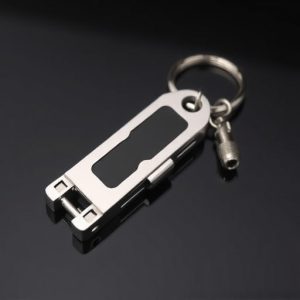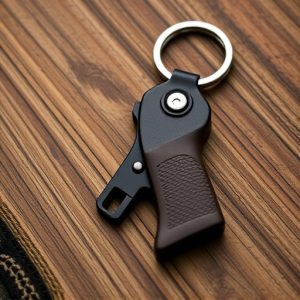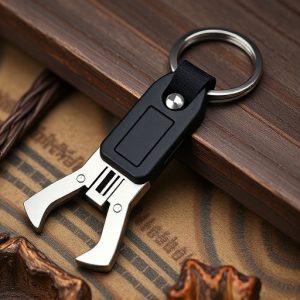Legal Carry: Navigating State Laws for Self-Defense Keychains
In many U.S. states, keychain tools with features like pepper spray or alarms are legal for self-def…….
In many U.S. states, keychain tools with features like pepper spray or alarms are legal for self-defense if used responsibly and comply with specific regulations (Permitted Self Defense Keychain Tools). Understanding state-by-state guidelines is crucial due to varying laws on items like fixed-blade knives, stun guns, and pepper spray. Always check local requirements regarding size, capacity, and permitted uses to ensure legal carry and effective self-protection without breaking the law. Opting for reputable brands that adhere to local laws is essential for safety and legality.
“In today’s unpredictable world, understanding self-defense laws and knowing your rights is paramount. This article guides you through the intricacies of legal carry guidelines for defensive keychains, a popular and discreet self-defense tool. We explore ‘Permitted Tools’—what constitutes a legal self-defense keychain—and delve into ‘State-Specific Regulations,’ offering a comprehensive ‘Navigating the Landscape.’ From ‘Essential Considerations’ to real-world ‘Case Studies,’ this guide ensures you’re informed about the legalities and safety aspects of carrying a permitted self-defense keychain.”
- Understanding Self-Defense Laws: A Keychain Perspective
- Permitted Tools: What Constitutes a Legal Self-Defense Keychain?
- State-Specific Regulations: Navigating the Landscape
- Essential Considerations for Safe and Legal Carry
- Case Studies: Real-World Scenarios and Their Implications
Understanding Self-Defense Laws: A Keychain Perspective
In many states, the concept of self-defense is a cornerstone of personal safety laws, and this extends to the possession of certain keychain tools designed for protection. Understanding what constitutes permitted self-defense keychain tools is vital for individuals looking to arm themselves with legal options. These tools are often compact and easy to carry, allowing users to defend themselves in various situations without drawing unnecessary attention.
Keychains equipped with self-defense features, such as pepper spray or tactical alarms, fall under the category of legal carry items when used responsibly. It’s crucial for carriers to familiarize themselves with their state’s specific regulations regarding self-defense keychain tools, ensuring they remain within the confines of the law. This knowledge empowers individuals to protect themselves while steering clear of potential legal repercussions.
Permitted Tools: What Constitutes a Legal Self-Defense Keychain?
When it comes to legal self-defense keychains, understanding what tools are permitted is crucial. In many jurisdictions, a keychain designed for self-defense must adhere to specific guidelines to be considered legal. This typically includes limitations on the types and size of blades, as well as other features that could be used as weapons. For instance, a small, fixed-blade knife or a spike attached to the keychain is usually acceptable, provided it locks into place and cannot easily be activated by accident. Spring-loaded knives or devices with sharp points designed for self-defense are generally permitted, but their size and strength are often regulated.
The key aspect that distinguishes a legal self-defense keychain from an illegal weapon is its intended use and design. Tools must be primarily functional as a keychain, with the self-defense feature being a secondary consideration. This means they should include a secure attachment mechanism for keys, such as a durable chain or loop, and the self-defense component should be easily distinguishable from the keyring functionality. Additionally, any moving parts that could cause injury if used aggressively must be designed with safety in mind, ensuring they do not pose an unreasonable risk to others.
State-Specific Regulations: Navigating the Landscape
Navigating state-specific regulations regarding defensive keychain tools can be a complex task. Each U.S. state has its own set of laws and guidelines, varying widely in terms of what constitutes a “permitted self-defense keychain tool.” For instance, some states allow only certain types of pepper spray or stun guns, while others have more inclusive policies. Understanding these nuances is essential for responsible carry and potential legal defense.
When considering defensive keychains, it’s crucial to research your state’s specific requirements. This includes learning about any restrictions on size, capacity, and permitted uses. Staying informed ensures that you’re in compliance with the law, empowering you to protect yourself effectively while avoiding unnecessary legal repercussions. Remember, what’s legally permissible varies across states, so always check your local regulations before equipping yourself with a self-defense keychain tool.
Essential Considerations for Safe and Legal Carry
When considering carrying a defensive keychain for self-defense, understanding legal boundaries and prioritizing safety is paramount. Not all keychains are created equal when it comes to legality and effectiveness; thus, it’s crucial to know what constitutes permitted self-defense tools. Each state has its own set of regulations governing the use and carry of such devices, so being well-informed about your rights and responsibilities is essential.
Safety features like a quick-release mechanism or an integrated alarm can enhance the functionality but also have legal implications. Always opt for reliable and reputable brands that comply with local laws, ensuring you’re not breaking any regulations. Remember, carrying a defensive keychain is a personal choice, but it should never infringe upon the safety of others or encourage inappropriate use.
Case Studies: Real-World Scenarios and Their Implications
In the realm of personal safety, understanding the legal implications of carrying self-defense tools is paramount. Case studies from various states provide valuable insights into what’s permitted and what isn’t when it comes to defensive keychain items. For instance, in one notable case, a citizen faced charges after using a small pepper spray device attached to their keychain during an attempted robbery. This scenario highlights the importance of knowing local laws, as some jurisdictions allow pepper spray as a self-defense measure, while others strictly regulate its use.
These real-world scenarios underscore the need for individuals to educate themselves about the specific rules regarding permitted self-defense keychain tools. Depending on the state, regulations can vary widely; some may permit certain types of personal defense devices, such as small pepper sprays or noise makers, while others might restrict or ban them entirely. Being aware of these guidelines ensures citizens can legally protect themselves in emergency situations without crossing legal boundaries.
Understanding self-defense laws, especially as they pertain to legal keychain carry, is crucial for responsible individuals seeking to protect themselves. By familiarizing themselves with permitted tools and state-specific regulations, folks can ensure they’re acting within the law while enhancing their personal safety. Essential considerations for safe and legal carry, backed by real-world case studies, underscore the importance of informed decision-making when it comes to self-defense keychains. Remember that knowledge is the ultimate weapon, empowering individuals to navigate potential threats with confidence and legality.


